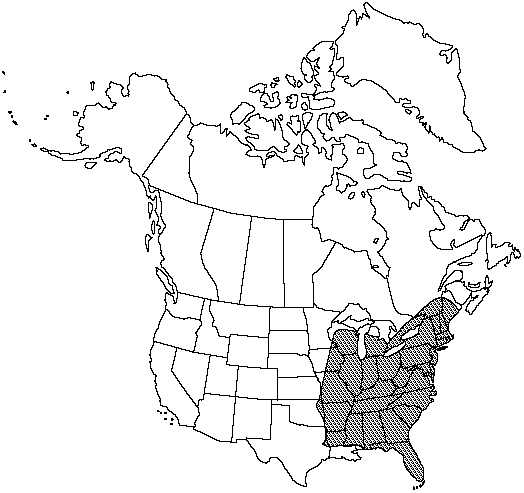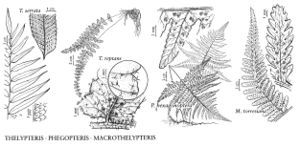FNA>Volume Importer |
FNA>Volume Importer |
| Line 25: |
Line 25: |
| | }}<!-- | | }}<!-- |
| | | | |
| − | --><span class="statement" id="st-d0_s0" data-properties="stem growth form or orientation;stem diameter"><b>Stems </b>long-creeping, 2–4 mm diam.</span> <span class="statement" id="st-d0_s1" data-properties="leaf architecture;leaf condition;leaf some measurement;leaf arrangement;leaf some measurement"><b>Leaves </b>monomorphic, dying back in winter, often 1–2 cm apart, ca. 25–75 cm.</span> <span class="statement" id="st-d0_s2" data-properties="petiole coloration;petiole atypical length;petiole length;petiole width;petiole shape;petiole pubescence;petiole pubescence;scale coloration"><b>Petiole </b>straw-colored, (7–) 20–45 cm × 1.5–3 mm, at base with scales tan, lanceolate, glabrous or marginally hairy.</span> <span class="statement" id="st-d0_s3" data-properties="blade shape;blade shape;blade orientation;blade orientation;proximal pinna length or size;proximal pinna atypical some measurement;proximal pinna some measurement;proximal pinna length"><b>Blade </b>broadly deltate, about as broad as long, (8–) 15–33 cm, proximal pinnae longest and narrowed at base, usually spreading or slightly ascending.</span> <span class="statement" id="st-d0_s4" data-properties="pinna length;pinna atypical width;pinna width;pinna fusion;pinna shape"><b>Pinnae </b>7–20 × 2–6 (–8) cm, all connected by wing along rachis, deeply pinnatifid;</span> <span class="statement" id="st-d0_s5" data-properties="segment shape;segment shape;segment shape;segment position">segments entire or largest pinnatifid about halfway to costule;</span> <span class="statement" id="st-d0_s6" data-properties="segment arrangement;vein shape">proximal pair of veins from adjacent segments meeting margin above sinus, veins often forked.</span> <span class="statement" id="st-d0_s7" data-properties="indument some measurement;indument some measurement;gland coloration;gland architecture;scale coloration;scale coloration;scale coloration;scale shape;scale orientation;scale pubescence;scale some measurement"><b>Indument </b>abaxially of moderately to densely set hairs mostly 0.1–0.25 mm along costae and veins, also of yellowish stalked glands 0.1 mm on veins and blade tissue, costae with whitish to light tan, narrowly lanceolate, spreading, marginally hairy scales to ca. 1.5 mm.</span> <span class="statement" id="st-d0_s8" data-properties=""><b>Sori </b>subterminal on veins.</span> <span class="statement" id="st-d0_s9" data-properties="sorus position;2n chromosome count">2n = 60.</span><!-- | + | --><span class="statement" id="st-undefined" data-properties=""><b>Stems </b>long-creeping, 2–4 mm diam. <b>Leaves</b> monomorphic, dying back in winter, often 1–2 cm apart, ca. 25–75 cm. <b>Petiole</b> straw-colored, (7–)20–45 cm × 1.5–3 mm, at base with scales tan, lanceolate, glabrous or marginally hairy. <b>Blade</b> broadly deltate, about as broad as long, (8–)15–33 cm, proximal pinnae longest and narrowed at base, usually spreading or slightly ascending. <b>Pinnae</b> 7–20 × 2–6(–8) cm, all connected by wing along rachis, deeply pinnatifid; segments entire or largest pinnatifid about halfway to costule; proximal pair of veins from adjacent segments meeting margin above sinus, veins often forked. <b>Indument</b> abaxially of moderately to densely set hairs mostly 0.1–0.25 mm along costae and veins, also of yellowish stalked glands 0.1 mm on veins and blade tissue, costae with whitish to light tan, narrowly lanceolate, spreading, marginally hairy scales to ca. 1.5 mm. <b>Sori</b> subterminal on veins. <b>2n</b> = 60.</span><!-- |
| | | | |
| | -->{{Treatment/Body | | -->{{Treatment/Body |
| Line 54: |
Line 54: |
| | |publication year=1852 | | |publication year=1852 |
| | |special status= | | |special status= |
| − | |source xml=https://jpend@bitbucket.org/aafc-mbb/fna-fine-grained-xml.git/src/287ef3db526bd807d435a3c7423ef2df1e951227/V2/V2_95.xml | + | |source xml=https://jpend@bitbucket.org/aafc-mbb/fna-data-curation.git/src/9216fc802291cd3df363fd52122300479582ede7/coarse_grained_fna_xml/V2/V2_95.xml |
| | |genus=Phegopteris | | |genus=Phegopteris |
| | |species=Phegopteris hexagonoptera | | |species=Phegopteris hexagonoptera |
| − | |2n chromosome count=60
| |
| − | |blade orientation=ascending;spreading
| |
| − | |blade shape=narrowed;deltate
| |
| − | |gland architecture=stalked
| |
| − | |gland coloration=yellowish
| |
| − | |indument some measurement=0.1;0.1mm;0.25mm
| |
| − | |leaf architecture=monomorphic
| |
| − | |leaf arrangement=apart
| |
| − | |leaf condition=dying
| |
| − | |leaf some measurement=25cm;75cm
| |
| − | |petiole atypical length=7cm;20cm
| |
| − | |petiole coloration=straw-colored
| |
| − | |petiole length=20cm;45cm
| |
| − | |petiole pubescence=hairy;glabrous
| |
| − | |petiole shape=lanceolate
| |
| − | |petiole width=1.5mm;3mm
| |
| − | |pinna atypical width=6cm;8cm
| |
| − | |pinna fusion=connected
| |
| − | |pinna length=7cm;20cm
| |
| − | |pinna shape=pinnatifid
| |
| − | |pinna width=2cm;6cm
| |
| − | |proximal pinna atypical some measurement=8cm;15cm
| |
| − | |proximal pinna length=longest
| |
| − | |proximal pinna length or size=long
| |
| − | |proximal pinna some measurement=15cm;33cm
| |
| − | |scale coloration=whitish;light tan
| |
| − | |scale orientation=spreading
| |
| − | |scale pubescence=hairy
| |
| − | |scale shape=lanceolate
| |
| − | |scale some measurement=0mm;1.5mm
| |
| − | |segment arrangement=adjacent
| |
| − | |segment position=halfway
| |
| − | |segment shape=pinnatifid;largest;entire
| |
| − | |sorus position=subterminal
| |
| − | |stem diameter=2mm;4mm
| |
| − | |stem growth form or orientation=long-creeping
| |
| − | |vein shape=forked
| |
| | }}<!-- | | }}<!-- |
| | | | |
| | -->[[Category:Treatment]][[Category:Phegopteris]] | | -->[[Category:Treatment]][[Category:Phegopteris]] |
Stems long-creeping, 2–4 mm diam. Leaves monomorphic, dying back in winter, often 1–2 cm apart, ca. 25–75 cm. Petiole straw-colored, (7–)20–45 cm × 1.5–3 mm, at base with scales tan, lanceolate, glabrous or marginally hairy. Blade broadly deltate, about as broad as long, (8–)15–33 cm, proximal pinnae longest and narrowed at base, usually spreading or slightly ascending. Pinnae 7–20 × 2–6(–8) cm, all connected by wing along rachis, deeply pinnatifid; segments entire or largest pinnatifid about halfway to costule; proximal pair of veins from adjacent segments meeting margin above sinus, veins often forked. Indument abaxially of moderately to densely set hairs mostly 0.1–0.25 mm along costae and veins, also of yellowish stalked glands 0.1 mm on veins and blade tissue, costae with whitish to light tan, narrowly lanceolate, spreading, marginally hairy scales to ca. 1.5 mm. Sori subterminal on veins. 2n = 60.
Habitat: In moist woods, usually in full shade, often in moderately acid soils
Elevation: 0–1000 m
Distribution
Ont., Que., Ala., Ark., Conn., Del., D.C., Fla., Ga., Ill., Ind., Iowa, Kans., Ky., La., Maine, Md., Mass., Mich., Minn., Miss., Mo., N.H., N.J., N.Y., N.C., Ohio, Okla., Pa., R.I., S.C., Tenn., Tex., Vt., Va., W.Va., Wis.
Discussion
G. A. Mulligan and W. J. Cody (1979) reported hybrids between Phegopteris hexagonoptera and P. connectilis from a few localities in Quebec, New Brunswick, and Nova Scotia. These hybrids are apogamous and have a chromosome number of 2n = 120.
Selected References
None.

